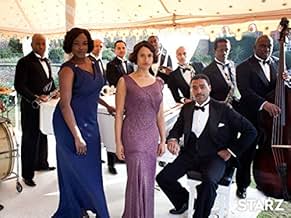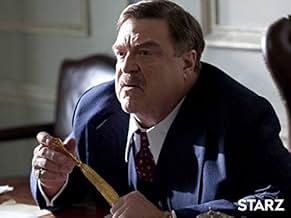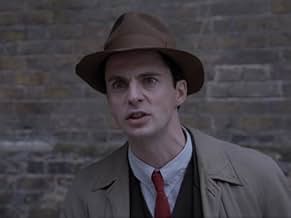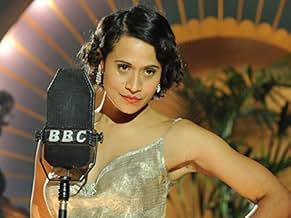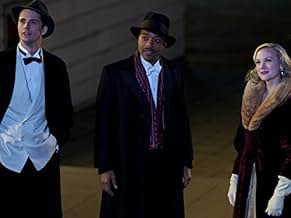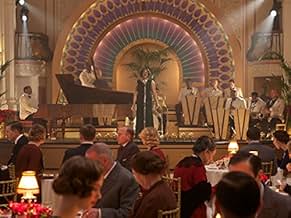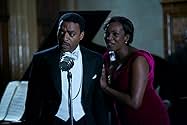AVALIAÇÃO DA IMDb
7,4/10
2,9 mil
SUA AVALIAÇÃO
Adicionar um enredo no seu idiomaSet in the 1930s, a black Jazz band rises in fame and popularity while becoming entangled in an intricate web of intrigue, mystery and suspense with the elite of London society.Set in the 1930s, a black Jazz band rises in fame and popularity while becoming entangled in an intricate web of intrigue, mystery and suspense with the elite of London society.Set in the 1930s, a black Jazz band rises in fame and popularity while becoming entangled in an intricate web of intrigue, mystery and suspense with the elite of London society.
- Indicado para 1 Primetime Emmy
- 5 vitórias e 16 indicações no total
Explorar episódios
Avaliações em destaque
No idea what to expect, but became totally hooked for these reasons: 1. Intelligent dialogue and storyline. A very well researched period piece dealing with both early 20th century British culture (a little American too); influence of music in culture (in this case mostly jazz); aristocracy relations with the poor (things never change); black (and other groups) relations with white power (money, politics, etc.). 2. Superb acting. 3. Superb period singing and accompanying music. 4. Most importantly for a quality film is attention to detail. 5. Suspenseful drama (Whodunit?). 6. Left room for a continuation which, unfortunately, doesn't appear to be in the works. 7. Interesting final episode of tidying up loose ends, even interviewing the dead as if they never died.
This new series has been trailed for weeks and the trailer certainly caught my attention so it already had a lot to live up to. I am pleased to say that it did not fail and I have very much enjoyed the first two episodes and looking forward to next week's already. Some of the music is quite exciting but I am not sure it is true to the jazz music which was being listened to in the early thirties but nevertheless very enjoyable. I like the casting,particularly the female roles and specifically Jess, Rosie,Pamela and the photographer. Jacqueline Bisset is excellent as is the Stanley character. Hope it maintains the momentum but it will be disappointing if Jess has been killed off already. Would expect to see more of Rosie as there must be some sort of love triangle to develop.
Good points: Matthew Goode was excellent in his role as Stanley. His character was original and he carried the show, in my opinion. Most of the others were all right and did what they could with the material. The story kept me watching and interested to the end.
Bad points: It took place in a depopulated London (reminding me of 'Survivors' or 'Day of the Triffids') and never convinced me for a second that it was 1933. The tame music seemed very unlikely to offend anybody at that date, when much 'hotter' jazz had been available for at least a decade previously. Some of it sounded more like the swing music of the forties. Tom Hughes' character and acting was ho-hum. The hiding from the police became silly and unbelievable in the last episode.
Like others, I cannot understand why the BBC think this director is something special and throw money in his direction. But it's worth seeing.
Bad points: It took place in a depopulated London (reminding me of 'Survivors' or 'Day of the Triffids') and never convinced me for a second that it was 1933. The tame music seemed very unlikely to offend anybody at that date, when much 'hotter' jazz had been available for at least a decade previously. Some of it sounded more like the swing music of the forties. Tom Hughes' character and acting was ho-hum. The hiding from the police became silly and unbelievable in the last episode.
Like others, I cannot understand why the BBC think this director is something special and throw money in his direction. But it's worth seeing.
For so many people not liking this, it has a high rating here on IMDb. I enjoyed it but see its flaws.
I am not familiar with the work of Stephen Poliakoff, so I can't comment on the criticisms of him.
The series is about a black jazz band in the 1930s who is discovered by a music journalist, Stanley Mitchell (Matthew Goode). With Wesley's help, the group is booked at the upscale Imperial Hotel and even entertain Prince George (erroneously described during the program as the Prince of Wales, who was actually Edward, Prince of Wales).
The band becomes successful and is written up often by Mitchell. With two talented singers (Wunmi Mosaku and Angel Coulby), they come to the attention of a record company and radio. But tragedy strikes, and the ensuing events threaten to ruin the band.
I'm at a disadvantage here because I'm not familiar with early '30s jazz music, but the critiques say the music presented is actually from a decade later. The songs are original to the production, which were also criticized. The producers certainly could have found actual songs, but I suppose they didn't want to pay for the rights. A couple of the songs weren't very good.
It's an expensive production with some excellent actors: Goode, who I've always loved, Chiwetel Ejiofor as Louis Lester, the leader of the band, Anthony Head, John Goodman, Tom Hughes, and Jacqueline Bisset. Very formidable.
There was also criticism that the series did not really evoke the '30s. I thought it looked wonderful, particularly the hotel scenes. But I agree, there was something missing in the period feel.
Fascinating to me was the statement in the series that the Brits didn't know what Americans sounded like until the advent of talking pictures, as well as the talk of the wireless. One really does get the feeling of limited communication and how far we've come.
Suspenseful, well-acted, this could have been more fascinating with some stronger writing, attention to period details, and maybe some cutting, perhaps to four episodes instead of six.
The research wasn't perfect -besides the Prince of Wales ID, there was also the reference to Clark Gable. In 1933, Clark Gable was just coming onto the radar in the U. S. Ronald Colman would have been much better. The devil is in the details.
I am not familiar with the work of Stephen Poliakoff, so I can't comment on the criticisms of him.
The series is about a black jazz band in the 1930s who is discovered by a music journalist, Stanley Mitchell (Matthew Goode). With Wesley's help, the group is booked at the upscale Imperial Hotel and even entertain Prince George (erroneously described during the program as the Prince of Wales, who was actually Edward, Prince of Wales).
The band becomes successful and is written up often by Mitchell. With two talented singers (Wunmi Mosaku and Angel Coulby), they come to the attention of a record company and radio. But tragedy strikes, and the ensuing events threaten to ruin the band.
I'm at a disadvantage here because I'm not familiar with early '30s jazz music, but the critiques say the music presented is actually from a decade later. The songs are original to the production, which were also criticized. The producers certainly could have found actual songs, but I suppose they didn't want to pay for the rights. A couple of the songs weren't very good.
It's an expensive production with some excellent actors: Goode, who I've always loved, Chiwetel Ejiofor as Louis Lester, the leader of the band, Anthony Head, John Goodman, Tom Hughes, and Jacqueline Bisset. Very formidable.
There was also criticism that the series did not really evoke the '30s. I thought it looked wonderful, particularly the hotel scenes. But I agree, there was something missing in the period feel.
Fascinating to me was the statement in the series that the Brits didn't know what Americans sounded like until the advent of talking pictures, as well as the talk of the wireless. One really does get the feeling of limited communication and how far we've come.
Suspenseful, well-acted, this could have been more fascinating with some stronger writing, attention to period details, and maybe some cutting, perhaps to four episodes instead of six.
The research wasn't perfect -besides the Prince of Wales ID, there was also the reference to Clark Gable. In 1933, Clark Gable was just coming onto the radar in the U. S. Ronald Colman would have been much better. The devil is in the details.
Based on a hitherto undiscovered aspect of British history, DANCING ON THE EDGE tells of the fortunes of an African-Caribbean jazz band in 1930s upper-class British society. Louis Lester serves an apprenticeship in the United States, then takes London by storm with the help of talented singers Jessie and Carla. Initially managed by Wesley, who drives a hard bargain but manages to offend just about everyone, the band is eventually guided by white fixer Stanley, who just so happens to run one of London's leading music papers, a rival to the much better- known "Melody Maker." Poliakoff has a fascinating story to tell of a basically racist society that nonetheless embraces the Louis Lester jazz band, which provides the kind of music than no one has ever heard before. The band are so successful that they even attract the interest of the Prince of Wales (the future King Edward VIII). At the same time polite society has a seamy underbelly; if anyone dares to question the idea of white supremacy, then they are summarily dealt with. This rule applies to white and nonwhite people alike. The television series attracted mixed reviews on its premiere in February and March 2013; after having read Poliakoff's excellent screenplay, I am rather nonplussed as to why DANCING ON THE EDGE generated this kind of reaction.
Você sabia?
- CuriosidadesJenna Coleman and Tom Hughes would go on to star together as Queen Victoria and Prince Albert in the ITV period drama Vitória: A Vida de uma Rainha (2016).
- Erros de gravaçãoThe musical style of Louis Lester's band, and especially the vocal styles of his singers and the sorts of songs they perform, are typical of the 1950's, not the 1930's.
- ConexõesFeatured in The Wright Stuff: Episode #18.20 (2013)
Principais escolhas
Faça login para avaliar e ver a lista de recomendações personalizadas
- How many seasons does Dancing on the Edge have?Fornecido pela Alexa
Detalhes
- Data de lançamento
- País de origem
- Idioma
- Também conhecido como
- 邊緣之舞
- Locações de filme
- Severn Valley Railway, Shropshire, Inglaterra, Reino Unido(Folkestone and South Bromley stations)
- Empresas de produção
- Consulte mais créditos da empresa na IMDbPro
Contribua para esta página
Sugerir uma alteração ou adicionar conteúdo ausente




